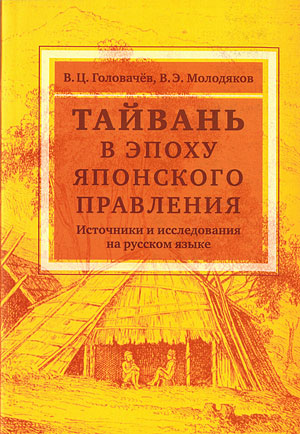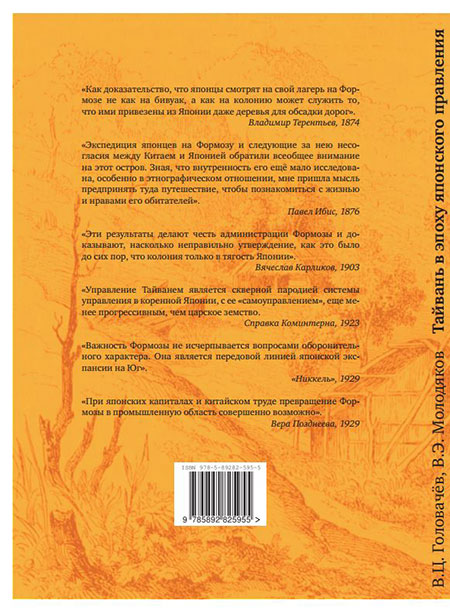Книга
 Тайвань в эпоху японского правления: источники и исследования на русском языке. Аналитический обзор.
Тайвань в эпоху японского правления: источники и исследования на русском языке. Аналитический обзор.
 Тайвань в эпоху японского правления: источники и исследования на русском языке. Аналитический обзор.
Тайвань в эпоху японского правления: источники и исследования на русском языке. Аналитический обзор.

Головачев Валентин Цуньлиевич, Молодяков Василий Элинархович
Ответственный редактор: Молодякова Эльгена Васильевна
Москва, 2014, 120 стр.
Первый историографический обзор публикаций на русском языке, описывающих или исследующих Тайвань в период с 1870-х гт. и в годы японского колониального правления (1895-1945). В поле зрения авторов — практически вся российская историография, включая забытые и малодоступные материалы. Обзор является частью долговременного международного проекта, осуществляемого совместно Институтом востоковедения РАН (Москва) и университетом Такусёку (Токио).
English version
This book presents a preliminary historiographical review of the Russian language publications, describing or researching Taiwan since the times of the Japanese military expedition in 1874 and during the Japanese colonial rule (1895-1945).
Chapter One contains the description and analysis of the pre-revolutionary publications of the news reports or materials of analytical, scientific and popular character. Chapter Two presents the studies of colonial Taiwan in the Soviet political analytics (1920- 1930s), and Chapter Three informs about the Soviet and Russian historiography of the post-WWII period to the present day
The book covers a wide range of publications, which were not easily accessible for the scholars and readers previously, due to their dispersion among numerous archives of many cities. For the first time ever, the authors reviewed practically the entire Russian historiography, including many forgotten publications and manuscripts.
What motivated the interest of Russian authors in Taiwan (Formosa) studies? How complete and adequate were their perceptions of the island, its natives and rulers? How objective and accurate was the reflection of these views in Russian language materials? How significant was the development and support of Taiwan studies by the island’s colonial authorities and by the Russian government? How extensive was the impact of geopolitical and ideological factors on more than a century-old dynamics, activity, nature and results of Taiwan studies? All these questions are raised and addressed to some extent in this book.
This historiographical review is part of a long-term international project, implemented jointly by the Institute of Oriental Studies, Russian Academy of Science (Moscow) and Takushoku University (Tokyo), founded in 1900 as a special school of the “Taiwan society.”



